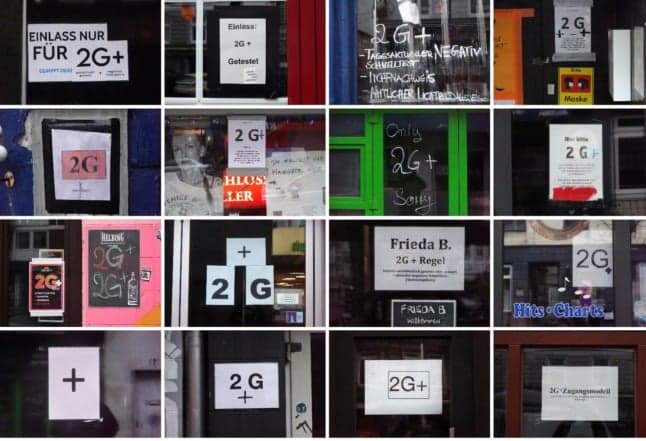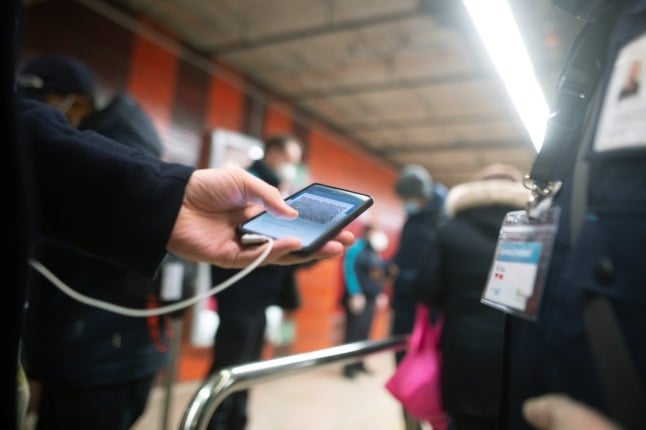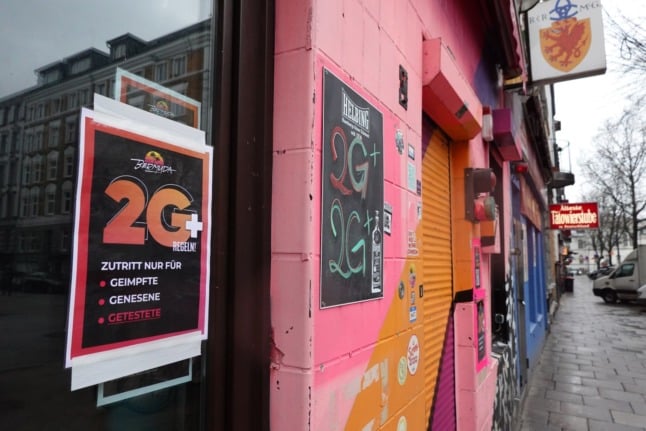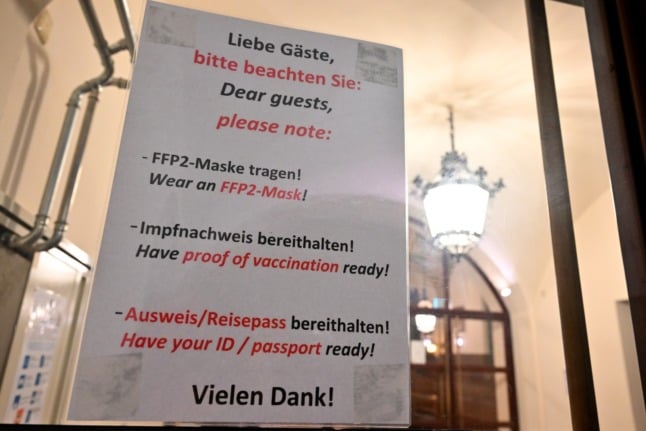OPINION: The pandemic has revealed Germany's deep obsession with rules and compliance

With Germany introducing tighter restrictions on vaccinated people - the latest in a long line of convoluted rules - Brian Melican explains the typical German traits that have made the measures harder to live with and pleads for common sense.
The wind whips over frozen puddles in the gutter and heaps of road grit. I’m stood outside a mobile phone repair shop with two other people in Hamburg-Eppendorf who, like me, have been foolish enough to try and take a photo with an important electronic device in the sub-zero conditions over Christmas. Monday 27th December 2021, 10am: the shop opens.
Well, it doesn’t really open. The lights go on and the shopkeeper comes to the door, unlocks it, and barks at us to put our masks on. “Impfnachweis!” he shouts at the first person in the queue before, having inspected their proof of vaccination with the demeanour of an Afghanistan-hardened army medic, reluctantly letting him in – and then slamming the door in the face of the second person in the queue and locking it shut again.
How could we have been naïve enough to think that we might be able to get out of the freezing cold and perhaps even avail ourselves of one of the two armchairs placed several yards away from the counter and its Perspex screen…? So we wait outside, now more nervous about not being admitted to shelter before hypothermia sets in than about how much the repair will cost. At least, I think to myself, I had the foresight to get my vaccination QR code in non-electronic credit-card format.
Increasingly difficult rules
That was life in Germany in late 2021. And life in Germany in early 2022 is about to get even worse – as of this weekend actually, when “2G-plus” will become the latest nationwide requirement for doing all sorts of things. Precisely what will, as ever, depend on factors varying from which of the 16 federal states you’re in (plucky Saxony-Anhalt, for instance, is sticking to plain 2G in restaurants), how the provider in question interprets the rules, and whether Jupiter is in the ascendancy. Goodie-two-shoes Hamburg has, true fo form, already enacted everything early.

A public transport passenger in Frankfurt shows vaccination proof during a check. Photo: picture alliance/dpa | Sebastian Gollnow
Essentially, to access restaurants and bars, as well as most other public venues except essential retail (however that is defined), those who have yet to get the booster jab or to recover from an infection with SARS-CoV2 within the last six months following a full course of vaccination will need to have a negative result from a lateral flow test taken no more than 24 hours (or a PCR test taken no less than 48 hours) previously; unless, of course… (cont. p94).
And so German officials’ valiant yet increasingly vain attempts to control the spread of coronavirus from behind their desks continue with ever more complicated rules which, while very much in tune with the minutiae of the latest virology research papers and checked by Legal to be 100 percent watertight, are becoming increasingly difficult to navigate for anyone who isn’t called Karl Lauterbach.
READ ALSO: What we know so far about Germany’s 2G-plus rules for restaurants
It would be unfair to single Germany out here: at some point in this pandemic, almost every European country has been subject to restrictions which were complex – and in some cases contradictory enough to trip even the most compliant. Friends in Spain tell me that, for a while, it was illegal to get a lift to work with another member of your own household in a jointly-owned car. And Boris Johnson was clearly baffled by the UK Governm… Okay, maybe not the best example. But you see my point.
A couple of particularly German traits, however, are making our current situation unbearable. Firstly, there’s our well-known tendency to take even overly-complex or patently pointless rules – and their application – very seriously. Secondly, our long-abeyant inability to moderate our tone and show kindness has resurfaced, quite unexpectedly and quite virulently.
From traffic lights to... everything
Let’s take excessive respect for rules first. In those halcyon pre-2020 days, the most visible instance of this was people stood in the dead of night waiting minutes on end for the little green man at the traffic lights while tumbleweeds rolled along the road. Now, waiters and waitresses, mobile-phone repair shop employees, and (of course!) Bademeister (lifeguards) all feel our national urge to comply – and indeed, if in doubt – over-comply with whatever the current busybody regulations are.
Take restaurants in Hamburg: many seem to think that it is a legal requirement that you check in using the dreaded Luca app (it isn’t), employ security staff to force you to pointlessly disinfect your hands (it’s month 20, guys, come on!), and enforce FFP2 mask-wearing even when you’re just going for a leak and the place is half empty.

A bar in Hamburg shows entry is only for vaccinated and recovered people with a test, or a booster. Photo: picture alliance/dpa | Marcus Brandt
You can’t blame the landlords, I guess: in a city whose mayor is a laboratory doctor by profession and in a country with some of the strictest Covid regulations on the continent, you might as well assume the worst. The cumulative effect, however, feels like a return to the worst days of post-war German gastronomy, when café owners would impose all sorts of rules on their long-suffering customers, the most notorious of which was “Draußen nur Kännchen!” – a petty refusal to serve single cups of coffee on outdoor tables which became an ironic catchphrase.
READ ALSO: What people who've had the J&J jab in Germany need to know
Rudeness returns
Maybe our national love of excessive compliance – affectionately referred to as Kadavergehorsam (literally "corpse obedience”) – wouldn’t grate as much if it weren’t for the violent resurgence of another clichéd German characteristic: bone-headed rudeness. It’s such a shame, because even within the short space of my lifetime, Germany had made strides here.
Where it had once been common for police officers to growl “Ausweis her!” to see your ID, and for train guards to bark orders at passengers, by the late 2010s, Germany had reached a relaxed, friendly public tone – direct at times, blunt even like in the Netherlands (or the north of England), but warm-hearted nevertheless. Now, a shouty “Halt! Hände desinfizieren!” (disinfect your hands) or a curt “Maske!” with a long E are the new refrains of a country once again strikingly ill-at-ease with itself. Other Germans are upset about this too, but we all just can’t seem to help ourselves whenever we are the ones exercising authority.

A Munich guesthouse with a sign asking people to have their vaccination pass and ID ready. Photo: picture alliance/dpa | Peter Kneffel
Without getting into the issue of whether vaccine passports are a suitable or proportionate long-term policy tool in the public health kit (and now that even the vaccinated are having to get tests, you could be forgiven for having your doubts), I’d like to close by making a simple suggestion: if people checking certifications were friendly and exercised some minor discretion from time to time, we could make everyone feel a lot better very quickly.
After all, for the unfortunate among us whose Covid immunity is predicated on anything more complicated than the standard three jabs, it could be a long and very cold winter. Especially if they happen to have a broken phone and their certificate is in the CovPass app.
Comments (7)
See Also
The wind whips over frozen puddles in the gutter and heaps of road grit. I’m stood outside a mobile phone repair shop with two other people in Hamburg-Eppendorf who, like me, have been foolish enough to try and take a photo with an important electronic device in the sub-zero conditions over Christmas. Monday 27th December 2021, 10am: the shop opens.
Well, it doesn’t really open. The lights go on and the shopkeeper comes to the door, unlocks it, and barks at us to put our masks on. “Impfnachweis!” he shouts at the first person in the queue before, having inspected their proof of vaccination with the demeanour of an Afghanistan-hardened army medic, reluctantly letting him in – and then slamming the door in the face of the second person in the queue and locking it shut again.
How could we have been naïve enough to think that we might be able to get out of the freezing cold and perhaps even avail ourselves of one of the two armchairs placed several yards away from the counter and its Perspex screen…? So we wait outside, now more nervous about not being admitted to shelter before hypothermia sets in than about how much the repair will cost. At least, I think to myself, I had the foresight to get my vaccination QR code in non-electronic credit-card format.
Increasingly difficult rules
That was life in Germany in late 2021. And life in Germany in early 2022 is about to get even worse – as of this weekend actually, when “2G-plus” will become the latest nationwide requirement for doing all sorts of things. Precisely what will, as ever, depend on factors varying from which of the 16 federal states you’re in (plucky Saxony-Anhalt, for instance, is sticking to plain 2G in restaurants), how the provider in question interprets the rules, and whether Jupiter is in the ascendancy. Goodie-two-shoes Hamburg has, true fo form, already enacted everything early.

Essentially, to access restaurants and bars, as well as most other public venues except essential retail (however that is defined), those who have yet to get the booster jab or to recover from an infection with SARS-CoV2 within the last six months following a full course of vaccination will need to have a negative result from a lateral flow test taken no more than 24 hours (or a PCR test taken no less than 48 hours) previously; unless, of course… (cont. p94).
And so German officials’ valiant yet increasingly vain attempts to control the spread of coronavirus from behind their desks continue with ever more complicated rules which, while very much in tune with the minutiae of the latest virology research papers and checked by Legal to be 100 percent watertight, are becoming increasingly difficult to navigate for anyone who isn’t called Karl Lauterbach.
READ ALSO: What we know so far about Germany’s 2G-plus rules for restaurants
It would be unfair to single Germany out here: at some point in this pandemic, almost every European country has been subject to restrictions which were complex – and in some cases contradictory enough to trip even the most compliant. Friends in Spain tell me that, for a while, it was illegal to get a lift to work with another member of your own household in a jointly-owned car. And Boris Johnson was clearly baffled by the UK Governm… Okay, maybe not the best example. But you see my point.
A couple of particularly German traits, however, are making our current situation unbearable. Firstly, there’s our well-known tendency to take even overly-complex or patently pointless rules – and their application – very seriously. Secondly, our long-abeyant inability to moderate our tone and show kindness has resurfaced, quite unexpectedly and quite virulently.
From traffic lights to... everything
Let’s take excessive respect for rules first. In those halcyon pre-2020 days, the most visible instance of this was people stood in the dead of night waiting minutes on end for the little green man at the traffic lights while tumbleweeds rolled along the road. Now, waiters and waitresses, mobile-phone repair shop employees, and (of course!) Bademeister (lifeguards) all feel our national urge to comply – and indeed, if in doubt – over-comply with whatever the current busybody regulations are.
Take restaurants in Hamburg: many seem to think that it is a legal requirement that you check in using the dreaded Luca app (it isn’t), employ security staff to force you to pointlessly disinfect your hands (it’s month 20, guys, come on!), and enforce FFP2 mask-wearing even when you’re just going for a leak and the place is half empty.

You can’t blame the landlords, I guess: in a city whose mayor is a laboratory doctor by profession and in a country with some of the strictest Covid regulations on the continent, you might as well assume the worst. The cumulative effect, however, feels like a return to the worst days of post-war German gastronomy, when café owners would impose all sorts of rules on their long-suffering customers, the most notorious of which was “Draußen nur Kännchen!” – a petty refusal to serve single cups of coffee on outdoor tables which became an ironic catchphrase.
READ ALSO: What people who've had the J&J jab in Germany need to know
Rudeness returns
Maybe our national love of excessive compliance – affectionately referred to as Kadavergehorsam (literally "corpse obedience”) – wouldn’t grate as much if it weren’t for the violent resurgence of another clichéd German characteristic: bone-headed rudeness. It’s such a shame, because even within the short space of my lifetime, Germany had made strides here.
Where it had once been common for police officers to growl “Ausweis her!” to see your ID, and for train guards to bark orders at passengers, by the late 2010s, Germany had reached a relaxed, friendly public tone – direct at times, blunt even like in the Netherlands (or the north of England), but warm-hearted nevertheless. Now, a shouty “Halt! Hände desinfizieren!” (disinfect your hands) or a curt “Maske!” with a long E are the new refrains of a country once again strikingly ill-at-ease with itself. Other Germans are upset about this too, but we all just can’t seem to help ourselves whenever we are the ones exercising authority.

Without getting into the issue of whether vaccine passports are a suitable or proportionate long-term policy tool in the public health kit (and now that even the vaccinated are having to get tests, you could be forgiven for having your doubts), I’d like to close by making a simple suggestion: if people checking certifications were friendly and exercised some minor discretion from time to time, we could make everyone feel a lot better very quickly.
After all, for the unfortunate among us whose Covid immunity is predicated on anything more complicated than the standard three jabs, it could be a long and very cold winter. Especially if they happen to have a broken phone and their certificate is in the CovPass app.
Join the conversation in our comments section below. Share your own views and experience and if you have a question or suggestion for our journalists then email us at [email protected].
Please keep comments civil, constructive and on topic – and make sure to read our terms of use before getting involved.
Please log in here to leave a comment.